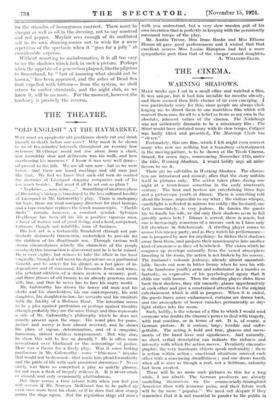THE THEATRE.
"OLD ENGLISH" AT THE HAYMARKET.
WIIY must an apoplectic old gentleman slowly eat and drink himself to death before our eyes ? Why must it be shown to us at ten minutes' intervals throughout an evening how :41:l-ant's Heythorpe could not rise alone from a chair, how incredibly slow and deliberate was his walk, and how overbearing his manners ? I know it was very well done— ail proved to the hilt. We are all sure now—but so we were before—that there are board meetings and old men just like that. We feel we know that such old men do control the destinies of Liverpool shipping companies and of far too much besides. But must it all be set out so plain ?
" Nephews . .. sons, mine ..." Something of an atmosphere of Browning's bishop is translated to the less cultured locality of Liverpool in Mr. Galsworthy's play. There is mahogany for lapis, there are rival company directors for rival bishops, and a tape machine replaces the Creek manuscripts. " Marble limbs " remain, however, a constant symbol. Sylvanus Heythorpe has been all his life a positive vigorous man, a lover of women and of good living, and a hard, competent, tortuous, though not infallible, man of business.
His last act is a technically fraudulent (though not par- ticularly dishonest) transaction, undertaken to provide for the children of his illegitimate son. Through various well shown circumstances (chiefly the characters of the people involved) this transaction is discovered and he is to be ruined. l le is over eighty, but refuses to take the affair in the least t ragically, though it will mean his dependence on a puritanical Coneril, and he orders for his dinner, as a last piece of in- dependence and of command, his favourite foods and wines. His petulant addition of a dozen oysters, a savoury, port, and three glasses of old brandy to an already generous menu kills him, and thus he never has to face his angry world.
Mr. Galsworthy has drawn the heavy old man. and his clerks and his shareholders, his one contemporary, his acid (laughter, his daughter-in-law, his servants and his creditors with the fidelity of a Holman Hunt. The intention seems to be a plea against puritanism or perhaps against timidity (though probably they are the same thing), and thus represents a side of Mr. Galsworthy's philosophy which he does not usually present upon the stage. His usual plea for peace, justice and mercy is here almost reversed, and he shows the place of vigour, determination, and of a sanguine, humorous, almost ruthless temperament. But why does he show this will to live so drearily ? He is often more recreational over blackmail or the miscarriage of justice. Here was a theme for a lively play. Was it some lurking puritanism in Mr. Galsworthy—some " blue-nose " impulse that would not be drowned—that made him plead for audacity and the pride of life with such persistent dreariness ? Never surely was there so competent a play so quietly gloomy, for not even a flash of tragedy relieves it. It is never crude or absurd, and only occasionally platitudinous.
But there conies a time (about 9.30) when you feel you will scream if Mr. Norman MeKinnel has to be pulled up even once more from his chair, or if he does that slow stump across the stage again: Not the regulation -stage old man's walk you understand, but a very slow wooden gait of his own invention that is perfectly in keeping with the persistently measured tempo of the play.
Mr. Austin Trevor, Miss Irene Rooke and Miss Ethune Honan all gave good performances and I wished that that excellent actress Miss Louise Hampton had had a more sympathetic part than that of the vinegar soused daughter.. A. WILLIAMS-ELLIS.










































 Previous page
Previous page